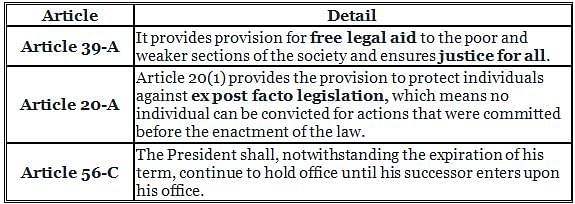Laxmikanth Test : Fundamental Rights- 2 - UPSC MCQ
10 Questions MCQ Test Indian Polity for UPSC CSE - Laxmikanth Test : Fundamental Rights- 2
Consider the following statements:
Statement-I:
Article 25 of the Indian Constitution guarantees individuals the right to freely profess, practice, and propagate religion.
Statement-II:
Article 26 of the Indian Constitution ensures that no person shall be compelled to pay any taxes for the promotion of any particular religion.
Which one of the following is correct in respect of the above statements?
Article 25 of the Indian Constitution guarantees individuals the right to freely profess, practice, and propagate religion.
Statement-II:
Article 26 of the Indian Constitution ensures that no person shall be compelled to pay any taxes for the promotion of any particular religion.
Which one of the following is correct in respect of the above statements?
Consider the following statements:
1. Article 21 of the Indian Constitution guarantees the right to life and personal liberty.
2. Article 21 is applicable only to Indian citizens and not to foreigners.
3. The Supreme Court of India has described Article 21 as the 'heart of fundamental rights.'
Which of the statements given above is/are correct?
2. Article 21 is applicable only to Indian citizens and not to foreigners.
3. The Supreme Court of India has described Article 21 as the 'heart of fundamental rights.'
| 1 Crore+ students have signed up on EduRev. Have you? Download the App |
Consider the following pairs:
1. Article 21A - Right to Privacy
2. Article 22 - Protection against Arrest and Detention
3. Article 23 - Prohibition of Child Labour
4. Article 24 - Prohibition of Employment of Children in Factories
How many pairs given above are correctly matched?
Consider the following statements:
Statement-I:
Article 27 of the Indian Constitution lays down that no person shall be compelled to pay any taxes for the promotion or maintenance of any particular religion or religious denomination.
Statement-II:
Article 28 of the Indian Constitution permits educational institutions maintained by religious groups to disseminate religious instruction.
Which one of the following is correct in respect of the above statements?
Consider the following statements:
1. Under Article 21, the right to life includes the right to live with human dignity.
2. The right to free and compulsory education for children aged 6 to 14 years is covered under Article 21A, which was added by the 86th Amendment Act of 2002.
3. The right to fair trial is not included under the expanded interpretation of the right to life.
Which of the statements given above is/are correct?
Consider the following statements:
Statement-I:
Article 30 of the Indian Constitution guarantees all religious and linguistic minorities the right to establish and administer educational institutions of their choice.
Statement-II:
Such institutions have the right to seek recognition for their levels and diplomas and aid wherein aid is given to other education institution establishments supplying similar schooling on the premise of their excellence
Which one of the following is correct in respect of the above statements?
The 86th Constitution Amendment Act, 2002 inserted which of the following articles in the Constitution of India?
In which year Fundamental Duties were incorporated in our constitution?
Which one of the following categories of Fundamental Rights incorporates protection against untouchability as a form of discrimination?
Consider the following statements:
1. Retrospective criminal legislation implies that a person cannot be convicted for an act that was not an offense at the time it was committed.
2. The immunity against retrospective criminal legislation extends to preventive detention provisions.
3. Under double jeopardy, a person cannot be convicted for the same offense more than once.
Which of the statements given above is/are correct?
|
145 videos|630 docs|203 tests
|
|
145 videos|630 docs|203 tests
|


















